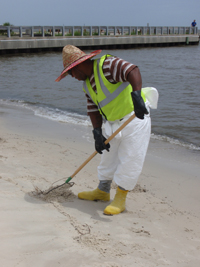The environmental and economic impacts of the oil disaster in the Gulf of Mexico have been well documented. But what hasn't been discussed as much are the psychological wounds it is inflicting on residents in the Gulf states.
People in the community have their entire lives invested in fishing, and being forced to leave or change careers brings up issues of loss — loss of vocation, loss of identity, loss of family tradition, said the Rev. George Bendall, pastor at Westminster Presbyterian Church in Gulfport, Miss. He was one of several area pastors who met with a General Assembly Mission Council delegation June 29.
Local pastors could use more help in dealing with these emotional setbacks, which affect clergy as well as members.
"We get tired and worn out too," he said. Pastors need help "not just with brick and mortar but with somebody who could serve long-term in our community for the emotional and the spiritual needs."
There's a lot of pastoral turnover in the area, pastors said. Spiritual and emotional fatigue are big issues for pastors, who often are trying to deal with their personal impacts from disasters while counseling their congregations.
"It's hard to go forward and help your congregation when your own guts are strewn across the highway," said the Rev. Sally-Lodge Teel, pastor of Ruth Memorial Presbyterian Church in Poplarville, Miss.

Teel has lived on the Gulf since the 1980s and is familiar with the cycle of starting over after disasters. But one of the differences in this disaster is the lack of answers. When hurricanes strike, people know how to prepare and rebuild.
With the oil spill, people don't have much information and don’t know when the leak will end, so they feel helpless and discouraged.
The Rev. Clint Regen, pastor of First Presbyterian Church in Pascagoula, Miss., likened the crisis to waiting for a cancer diagnosis: Everyone knows there's a sickness but they don't know its extent or how to proceed.
"Everything I've heard expressed on the road here, I've heard in Washington," said the Rev. J. Herbert Nelson II, director of public witness of the PC(USA)'s office in Washington. Politicians also don't know what to do, and no one will have any answers until the leak is stopped, he said.
"What we do know is where the answer lies — and it lies in an extreme amount of faith," Nelson said. "Help is on the way. Where it comes from we don't know, but it is on the way."

